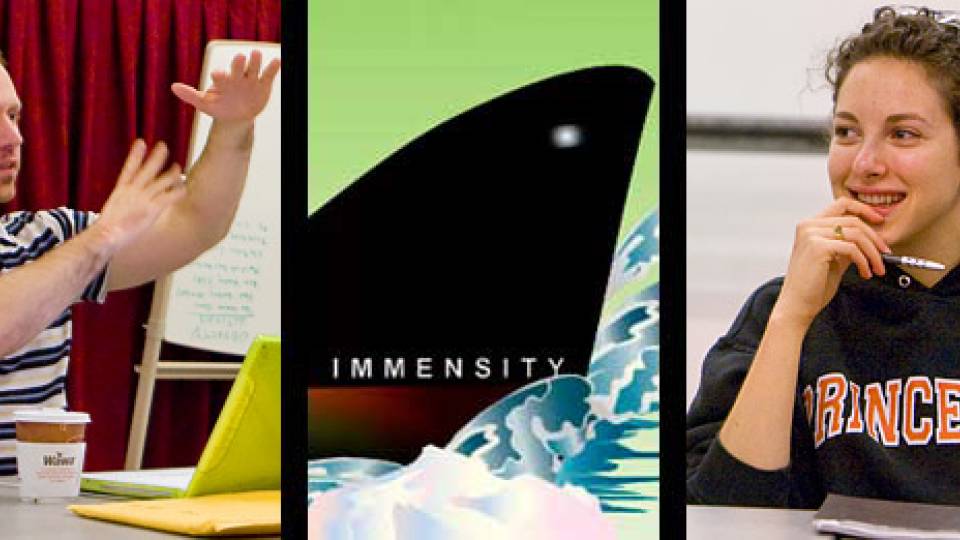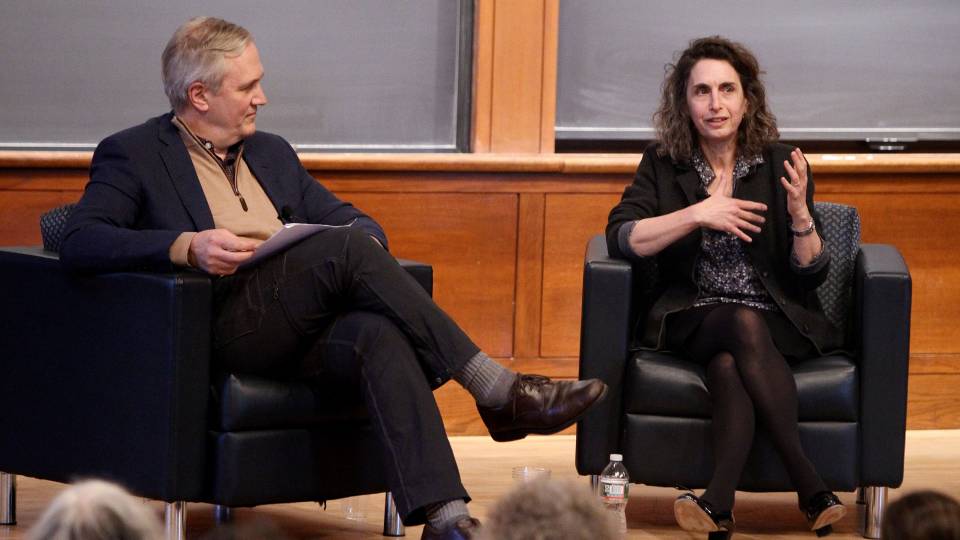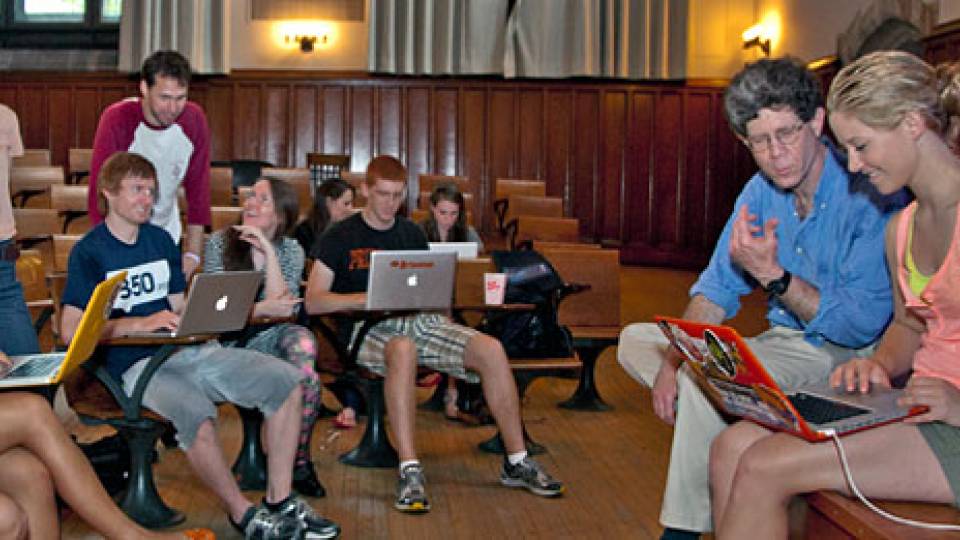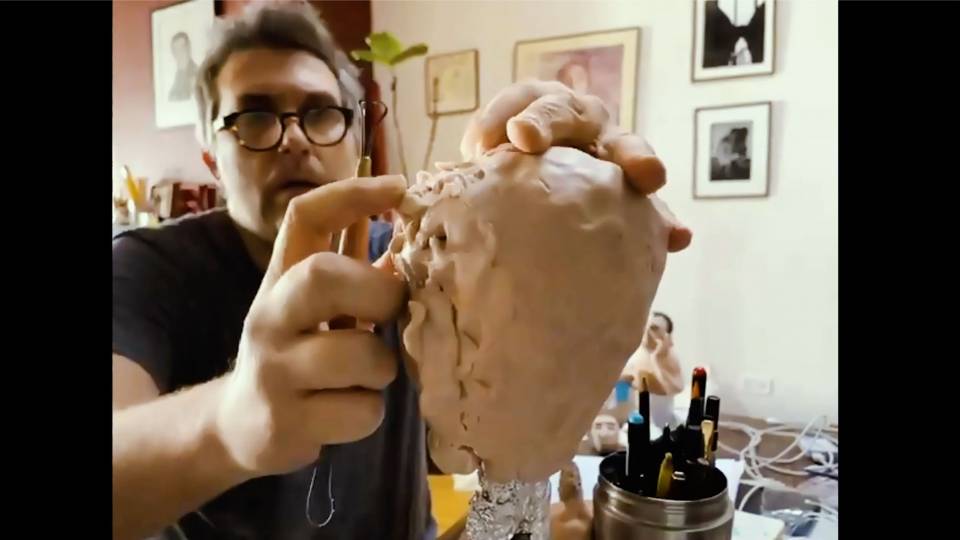Back to main story
While exploring the Panama Canal in a small tourist boat, Steve Cosson and Michael Friedman were startled by a massive container ship suddenly passing by, rocking them violently in its wake. Painted on the hull in Chinese characters, its name was boldly inscribed as "The Great Immensity." Cosson and Friedman later decided this would be the name of a play, serving as a metaphor for the impact of climate change on the Earth. The work-in-progress, "The Great Immensity," will be performed at McCarter's Berlind Theatre on Saturday, April 17.
This groundbreaking project of Cosson, a playwright, and Friedman, a composer, is the result of a unique collaboration between the Princeton Environmental Institute (PEI), the Princeton Atelier at the University's Lewis Center for the Arts, and the New York theater company, The Civilians. Cosson and Friedman are PEI's 2009-10 Currie C. and Thomas A. Barron '74 Visiting Professors in the Environment and the Humanities. Katharine Hackett, associate director of PEI, said, "By endowing this visiting professorship within PEI, Tom Barron, charter trustee and former alumni trustee of the University and member of PEI's advisory council, has provided both the inspiration and the resources to establish greater connections between environmental studies and the humanities at Princeton. Our yearlong collaboration with the Atelier Program at the Lewis Center and The Civilians theater is a wonderful example of the power of this gift."
The McCarter Theatre also has supported the project's development through its playwright's summer residency program, further adding to the expansive collaborative nature of the project.
It is at Princeton this academic year that the play's critical linking of the performing arts, humanities and sciences is coming to fruition. The play's themes of climate change, deforestation and extinction have been largely shaped by interviews and conversations Cosson and Friedman have had with PEI faculty, all of whom are experts on different pieces of the climate change puzzle. They also are involving undergraduates in the process, particularly the students in the course Cosson and Friedman are teaching, called "Princeton Atelier: Environmental Documentary and Music Theater." The students represent a cross-section of majors in the humanities, arts and sciences.
Steve Cosson, artistic director of The Civilians, talked about the play with Carol Peters of PEI.
Can you describe how you have collaborated at Princeton?
This is the first time The Civilians has been in residence in a science-focused academic center such as the Princeton Environmental Institute, and we are very excited to be able to work here and take advantage of the internationally recognized climate science experts on the Princeton faculty. It is wonderful that PEI, the Lewis Center for the Arts, and Princeton faculty and undergraduates who care about the environment are interested in collaborating to bring the sciences and humanities together so we can learn from each other and speak across disciplines.
We've spent this year working closely with PEI, the Lewis Center Atelier, faculty and undergraduates to discuss the subject matter of the play. We began the process in the fall by conducting research, which involved interviewing scientists we have been able to connect with because of PEI. We met and conducted lengthy interviews with (Frederick D. Petrie Professor in Ecology and Evolutionary Biology and PEI Director) Steve Pacala, (Albert G. Blanke Jr. Professor of Geosciences and PEI) Francois Morel, (Class of 1877 Professor of Zoology and Department of Ecology and Evolutionary Biology Chair) Dan Rubenstein, (Eugene Higgins Professor of Ecology and Evolutionary Biology) Jeanne Altmann, (Albert G. Milbank Professor of Geosciences and International Affairs and PEI) Michael Oppenheimer, (Professor of Ecology and Evolutionary Biology and PEI) Lars Hedin, (Professor of Mechanical and Aerospace Engineering) Robert Socolow, (Ira W. Decamp Professor of Bioethics in the University Center for Human Values) Peter Singer, (Senior Climate Modeler in Ecology and Evolutionary Biology) Elena Shevliakova, and (Lecturer in the Princeton Writing Program and PEI) Xenia Morin.
We have also been working very closely with undergraduates to develop the ideas that will be at the center of the show. Typically a playwright will work in isolation, but The Civilians works to publicly share what we are doing while it develops.
How are you weaving your experiences at Princeton into the play?
At Princeton we are looking at the intersection of environmental science and psychology. It is the name of a new field called "conservation psychology." This field explores what types of psychological factors influence environmental decision-making. This is a very exciting territory for artists and theater makers. We are trying to figure out how to take science ideas, not typical subject matter for playwrights -- and make them work in a play, by thinking about the way an audience will experience the story through the narrative and character.
If we figure this out, we might be able to shed light on how our personalities, psychological life and life experiences intersect with the subject matter, given all the information and complexities involved in understanding the subject of climate change.
In addition, the actors will represent a mix of professionals from The Civilians and Princeton undergraduates.
What are some of the psychological issues that have intrigued you the most as you've been writing the script?
One of the reasons we are doing this show is because we are motivated by "The American Paradox," which is this: Most Americans consider themselves to be environmentalists. They understand that the environment needs protection, and that climate change is caused by mankind. But in spite of this, people are reluctant to make changes in the way they live. Clearly, galvanizing the public will to affect political change is not happening, as we've seen since Al Gore's "An Inconvenient Truth." What's missing? Are natural systems even real to us? Are we part of it? Do we view climate issues as life and death issues, and if not, why not? Do we feel them personally? If we don't, how do we, as educators, change that? No one in the play will be a politician; we are not going to get into the story of what happens in policy, how decisions are made. We are modern people in cities and suburbs; we are studying our relationships to the world.
How did you write this play?
This is how I describe our process. We traveled to these extraordinary places, with questions about climate and the environment in mind. We spent time in the natural environment, talking to the people who live and work there. Now [through the play] we will try to illuminate the place and the complex reality of those landscapes. We asked questions not just about science but we asked how they think about the future -- do they face questions of climate change with hope or certainty of impending catastrophe?
Experiencing those conversations and interactions for ourselves transformed us. We learned a lot -- facts, information, ways of thinking -- and we experienced a change of consciousness. We thought about place and time differently while stretching and reaching to grasp the ideas we call "The Great Immensity." I don't think I will ever be able to fully grasp the enormity or complexity of all the issues, but it definitely became more real to me though the experiences I have had conducting research to write this script. This is the experience I want the audience to have while they watch the play. I want them to gain some comprehension of the enormity and complexity of nature, the environment, the issues that we face.
It is a long, slow process crafting a play, and we tried to decide what will give the audience that experience? They will have approximately 90 minutes in the theater. We had to craft a story, with a flow of ideas, and find a way to make it personal and knowable, while working with the way people think.
What are your goals for this production? Do you hope the audience will be educated, or inspired to act, or both?
We hope the audience will learn something through the experience of watching this play. I hope the audience will learn to ask: What role can theater play in climate change and our response to environmental crises? The best answer is that theater is working on an emotional and psychological level. I have become most interested in questions that pertain to understanding what it is about us culturally that affects our decision-making when it comes to the environment. We Americans care about the environment, and we generally comprehend these big, complex systems. So if we do care and understand, you'd think it would cause us to act to prevent climate change -- make the positive changes necessary to preserve the environment. It is hard to galvanize the public. They feel climate change is removed in time and space, because it does not seem to be happening now, in the world we know is real, so we make it a lower priority. With this play we're trying to affect consciousness, and by affecting consciousness hope that people will take responsibility and act. The play won't say "go recycle more," but hopefully it will work on the audience's understanding and emotions, and if it has the proper affect on those two things, it will make the problems we face more immediate and force people to understand that they have to act now.
Where have you traveled while conducting research for this play?
Michael Friedman and I took two research trips that formed the basis of our research for this project. One was to BCI -- Barro Colorado Island in Panama (Steve Pacala teaches there), which is a tropical island refuge known as "the most studied patch of the rain forest in the world." It is in the Panama Canal where we ran into the ship "The Great Immensity." We also traveled to Churchill, Manitoba, Canada. In Manitoba, climate change is affecting the polar bear business. Churchill is home to a great deal of polar bear tourism, because it is the place where the southernmost population of polar bears wait for the ice to freeze so they can continue north at the end of the summer. Many people travel there to watch the bears as they gather and wait, but as a result of climate change the polar bears are dying (the ice is lasting for shorter and shorter periods of time, reducing the time the polar bears have to hunt for food), so the income the residents of Churchill make from tourism is shrinking.
Global warming could affect Churchill in other ways as well, which is why it was such an important place for us to conduct interviews with local residents whose income is linked to the climate and its changes because of what they do (whether they are port workers or polar bear tour guides). In Churchill there is a port where container ships depart Canada to travel through the Hudson Bay, over the North Pole to Europe. There is speculation that due to the melting ice the shipping season will extend the northern route to make it more profitable; shipping would increase if the ice melts and the route is extended. We spent 10 days there, speaking to the people who live and work there. We spoke to the manager of the port, the polar bear guides and workers sorting the grain in the port. We wandered around and met very interesting people whose lives are being transformed because of climate change. All of these conversations and experiences inform the play, as do all the conversations we had at Princeton. The script continued to evolve during the class we have been teaching during the spring as well.
What we have discovered while conducting research for this project is that all the people we interviewed, whether scientists or polar bear guides, are struggling in their own way to understand the issues surrounding the prospect of climate change and global warming. Even experts, those who can fully get their heads around the science of climate change, must also understand the economics, policy, political sides of the issue as well, in order to grasp the entire issue. Whatever the point of entry into this subject, these issues are extremely complex, and it stretches the brain to think about them. It's like being in a little boat while a great ship goes by.
Do you believe a play can inspire or motivate people more effectively than a movie?
There is a difference between theater and movies in terms of what happens to your brain while watching a play, in terms of the face-to-face, interpersonal connection you can make with actors performing in the same room. For example, think of the difference between watching a TV news report about Afghanistan versus speaking directly with an Afghan. Part of why we work in theater is that theater has an ability to effect change. The brain is affected through the experience because effective theater becomes part of the imagination, part of your thinking, gradually, over time. A play is performed in real time, real space, there is a real person interacting with you in this space and time. It's not like TV or a movie. The audience will feel it, they will believe they have just had the opportunity to go into a rain forest and have a conversation with a botanist. That experience gets assimilated and integrated, which is very different than watching a projected image on a screen.
If the production is a success at McCarter, will you take it to other cities?
The McCarter production in the Berlind Theatre April 17 will be a workshop production, not the premiere. It will be an important step in the development of the show, not the show. The play will be a work-in-progress, there will be only two performances on April 17, and what happens then will determine if we produce it. Ideally, we would like to produce it in New York and hopefully in Princeton again. It would also be great to produce it in other cities, and take it on tour beyond the U.S. It would be especially nice to produce it in Canada and South America, because the play will pertain to all of the Americas.





